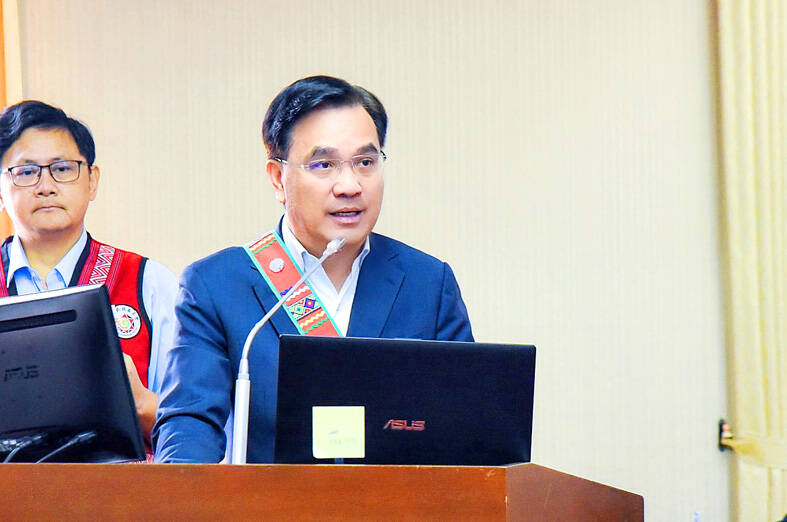The legislature yesterday passed an amendment that allows people with only one indigenous parent to register to obtain indigenous status.
The amendment to the Status Act For Indigenous Peoples (原住民身分法) follows a Constitutional Court ruling issued last year that deemed unconstitutional a provision granting indigenous status to people with only one indigenous parent based strictly on their name.
That ruling also upheld the right of adopted children to seek indigenous status.

Photo courtesy of the Council of Indigenous Peoples
“In practical terms, it increases the number of people with official indigenous status,” Council of Indigenous Peoples Minister Icyang Parod said.
As a result, the government would seek to boost the budget for indigenous peoples, for social welfare and other subsidies, he said.
In the past, if only the mother had indigenous status, when the child registered under their father’s surname, they would not be recognized as an indigenous person.
The Constitutional Court said that requirement contravened Article 7 of the Constitution, which stipulates that all people are equal under the law, regardless of gender.
Now, a child of one indigenous parent can gain indigenous status by registering with the traditional name of their indigenous parent, or with an indigenous name and a Chinese name, or by registering with the surname of their indigenous parent, but not their traditional indigenous name, Icyang said.
Ministry of the Interior data from the end of last year, showed that the nation’s indigenous population is rising, with about 584,000 people, 0.6 percent more than 2021, from the 17 recognized indigenous groups in Taiwan, which was 2.5 percent of the nation’s total population.

Taiwan has received more than US$70 million in royalties as of the end of last year from developing the F-16V jet as countries worldwide purchase or upgrade to this popular model, government and military officials said on Saturday. Taiwan funded the development of the F-16V jet and ended up the sole investor as other countries withdrew from the program. Now the F-16V is increasingly popular and countries must pay Taiwan a percentage in royalties when they purchase new F-16V aircraft or upgrade older F-16 models. The next five years are expected to be the peak for these royalties, with Taiwan potentially earning

POSITIVE DEVELOPMENT: Japan and the US are expected to hold in-depth discussions on Taiwan-related issues during the meeting next month, Japanese sources said The holding of a Japan-US leaders’ meeting ahead of US President Donald Trump’s visit to China is positive news for Taiwan, former Japan-Taiwan Exchange Association representative Hiroyasu Izumi said yesterday. After the Liberal Democratic Party’s landslide victory in Japan’s House of Representatives election, Japanese Prime Minister Sanae Takaichi is scheduled to visit the US next month, where she is to meet with Trump ahead of the US president’s planned visit to China from March 31 to April 2 for a meeting with Chinese President Xi Jinping (習近平). Japan and the US are expected to hold in-depth discussions on Taiwan-related issues during the

‘LIKE-MINDED PARTNER’: Tako van Popta said it would be inappropriate to delay signing the deal with Taiwan because of China, adding he would promote the issue Canadian senators have stressed Taiwan’s importance for international trade and expressed enthusiasm for ensuring the Taiwan-Canada trade cooperation framework agreement is implemented this year. Representative to Canada Harry Tseng (曾厚仁) in an interview with the Central News Agency (CNA) said he was increasingly uneasy about Ottawa’s delays in signing the agreement, especially as Ottawa has warmed toward Beijing. There are “no negotiations left. Not only [is it] initialed, we have three versions of the text ready: English, French and Mandarin,” Tseng said. “That tells you how close we are to the final signature.” Tseng said that he hoped Canadian Prime Minister Mark Carney

STAY IN YOUR LANE: As the US and Israel attack Iran, the ministry has warned China not to overstep by including Taiwanese citizens in its evacuation orders The Ministry of Foreign Affairs (MOFA) yesterday rebuked a statement by China’s embassy in Israel that it would evacuate Taiwanese holders of Chinese travel documents from Israel amid the latter’s escalating conflict with Iran. Tensions have risen across the Middle East in the wake of US and Israeli airstrikes on Iran beginning Saturday. China subsequently issued an evacuation notice for its citizens. In a news release, the Chinese embassy in Israel said holders of “Taiwan compatriot permits (台胞證)” issued to Taiwanese nationals by Chinese authorities for travel to China — could register for evacuation to Egypt. In Taipei, the ministry yesterday said Taiwan